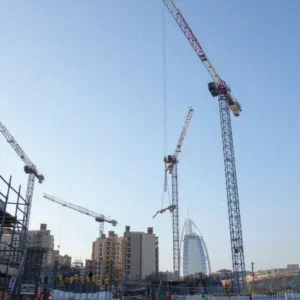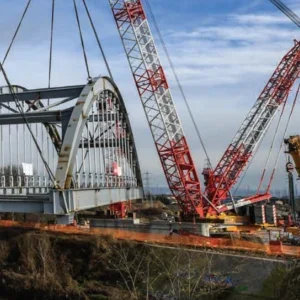Dubai worksite safety has dramatically improved due to the municipality’s new requirement that cranes are certified by recognised third parties.
Inspectors certify cranes according to British Standards – BS 7121 part 2. Cranes need at least annual inspection. Those lifting people, and all rigging gear, must be inspected every six months. Through the Dubai Accreditation Centre, the Municipality publishes a list of approved certification bodies and accreditation requirements. Before they are erected on site, contractors must show site certificates, a process that appears to have improved the area’s crane stock.
“I’ve worked all over the world, and Dubai is catching up with the rest of world,” says David Bailey, operations manager of certified body Arabian Bureau of Services.
The biggest problem, he says, is the lack of an operator certification in the region. “Cranes are being operated by unskilled people,” Bailey says. “People undergo a test to operate heavy equipment. A Group 7 licence covers any piece of heavy equipment. So third-country nationals – Indians and Pakistanis – are not being trained. They have driven a truck in their country, and so they drive a shovel or a wheel loader in front of the police, and are given a heavy equipment ticket, and they are employed in a company, put in a crane and put in the field. Which is scary.”
Bailey adds: “The people at fault seem to be the construction companies, who employ anyone to do anything, as cheap as possible.”
Safety engineer Ahmed Khalil Abdulkareem from Dubai Municipality building department says that operators must have a certificate from a competent person to work. He adds that a new operator accreditation system will apply from mid-2007 that may include eye tests. He says that the biggest problem is the lack of control on import of old cranes, and says that by December 2006 there were only 10 crane accidents on 6,000 projects.
In the Middle East, governments delegates safety to the working companies, according to Alex Mullins, Al Jaber Heavy Lift general manager.
“There is a very wide range of capability in safety standards,”Mullins says. “Many companies, particularly in the civil and buildings sector, are still of the misguided opinion that implementing safety procedures costs money and erodes profits.”
Standards are so poor on some sites that one international crane certification organisation decided against accrediting tower cranes, because it felt there was too great a risk that its certificates would be abused, or its advice ignored, said an crane inspector, who works for the company and did not want to be named.
“Major international companies use cranes that are sometimes brand new. Local companies, on the other hand, buy a few bits of metal, weld them together and throw it up,” he said. “Most tower cranes never get inspected; a lot are old.” He says that the Dubai environmental protection inspectors, though competent, are too few. The department is so understaffed that it only covers a fraction of sites that it should, he said. Alex Mullins from Al Jaber says that governments tend to be reactive rather than proctive.
Abdulkareem from the municipality does not disagree. “We are trying our best to control all over Dubai and everybody is welcome to give support,” he says.
Oil contractors, pushed by high-value loads and dangerous worksites, are taking the lead for safety improvements. “Anyone going into an oilfield, or secure areas, in onshore or offshore installations, must have evidence of a third party certification” to operate a crane, Bailey says.
And the oil companies have one of the most united stances on improving safety, Mullins says. “There are certainly signs of a proactive approach to the problem, for example the annual safety conference held by Abu Dhabi National Oil Companies (ADNOC) in the UAE, but there is much room to expand on this within the construction sector generally.
“It should also be borne in mind that although several of the Middle East countries belong to the Gulf Cooperation Council (GCC) – Kuwait, Qatar, Oman, Saudi Arabia, Bahrain and UAE – and can be legislated at that level, there are still considerable differences in the way safety procedures are implemented in each individual country, e. g. with regard to proof testing procedures after rigging and the use of 75% or 85% duty charts,” Mullins says.






